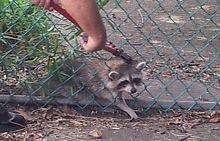 Ocean County Freeholder Deputy Director Gerry P. Little, Liaison to the Ocean County Board of Health, said, “With the warmer weather finally arriving, it seems everyone is anxious to enjoy the outdoors, putting them at risk for contact with an animal that may be infected with rabies. Rabies is a fatal disease and it is important for people to take personal precautions, take the time to talk to your children about rabies and not approaching stray animals and to make sure your home and yard is animal-proofed.”
Ocean County Freeholder Deputy Director Gerry P. Little, Liaison to the Ocean County Board of Health, said, “With the warmer weather finally arriving, it seems everyone is anxious to enjoy the outdoors, putting them at risk for contact with an animal that may be infected with rabies. Rabies is a fatal disease and it is important for people to take personal precautions, take the time to talk to your children about rabies and not approaching stray animals and to make sure your home and yard is animal-proofed.”
Daniel E. Regenye, Ocean County Health Department (OCHD) Public Health Coordinator, added, “In addition, we strongly recommend that people do not handle stray or feral cats. Some animals may be rabid even though they appear to be normal. We ask people not to feed stray cats; this could invite other wild animals, which could be rabid, into your yard. Raccoons are fond of cat food.”
“Cat scratches from a stray or feral cat should never be ignored,” Regenye added, “although rabies is most commonly contracted through the bite (saliva) of a rabid animal, with cat’s grooming habits; there is the possibility of saliva being introduced into a person through a scratch.”
“It is difficult during the warmer weather months to always know the actual number of rabid animals in our community as testing of animals for rabies is generally limited to those which have exposed residents or domestic pets.”
Jennifer Crawford, OCHD Supervisor of Communicable Disease, added, “Any strange-acting animal could have rabies.
Anyone that finds a wild or homeless animal acting strangely or aggressively should avoid contact with the animal and notify the local animal control officer or local police department, describing the animal and its location. You can find the telephone number of your local animal control officer on the Ocean County Health Department website at www.ochd.org, under RESOURCES or call the Health Department at 732-341-9700, ext. 7515.
Crawford reminds everyone the importance of getting your family pets vaccinated against rabies. She said, “Even if your pets do not go outdoors, they could accidently get out the door and come in contact with a rabid animal.” Other tips from the Ocean County Health Department on limiting family and pet exposure to rabies are:
• Make sure all garbage is stored in animal-resistant containers
• Screen off vents to attics and other areas that could provide shelter for bats.
• Vaccinate your cat or dog against rabies. Unvaccinated animals can contract rabies from wild animals and transmit the infection to humans. There are safe and effective vaccines to protect dogs, cats, horses, cattle and sheep against the disease.
• Cat owners should be encouraged to keep cats vaccinated against rabies and house them exclusively indoors or contained on a property instead of free-roaming to minimize their contact with raccoons and other potentially rabid wildlife.
If you are bitten by an animal:
• Learn as much as you can about the animal. If the animal is with its owner, get the owner’s name and address. If it is a stray or wild animal, try to remember the location where you last saw the animal and any identifying features on the animal for the animal control officer to use in tracking it later.
• Wash your wound immediately with plenty of soap and water.
• Contact your physician, health care provider or hospital emergency department for wound care and consultation regarding the need for rabies preventative treatment.
• Report the incident to the Ocean County Health Department at 732-341-9700, ext. 7515.
Free rabies vaccinations are available almost every Wednesday by appointment at the Ocean County Animal Facilities. For information on these or other free rabies vaccination opportunities for your pets, please call the Ocean County Health Department at 732-341-9700, ext. 7515 or visit the OCHD website “Events Calendar” at www.ochd.org.
[TLS]

